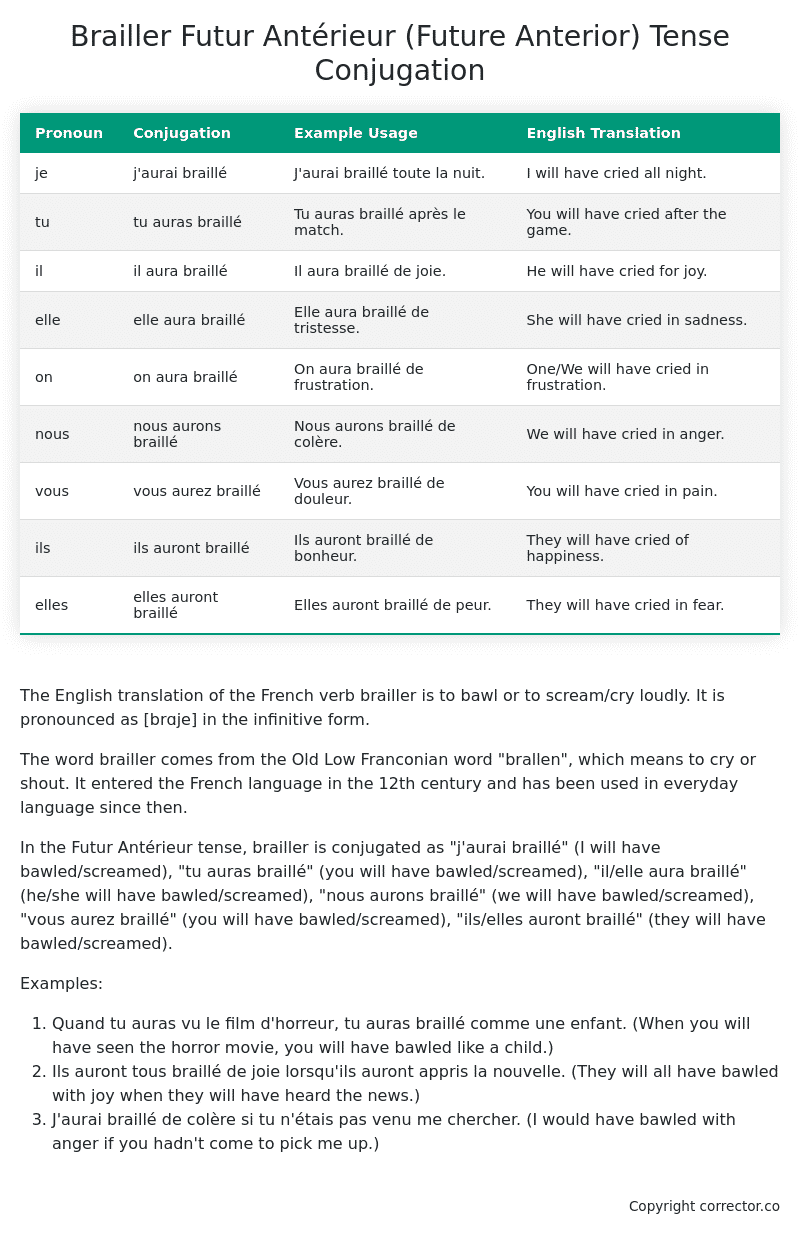Futur Antérieur (Future Anterior) Tense Conjugation of the French Verb brailler
Introduction to the verb brailler
The English translation of the French verb brailler is to bawl or to scream/cry loudly. It is pronounced as [brɑje] in the infinitive form.
The word brailler comes from the Old Low Franconian word “brallen”, which means to cry or shout. It entered the French language in the 12th century and has been used in everyday language since then.
In the Futur Antérieur tense, brailler is conjugated as “j’aurai braillé” (I will have bawled/screamed), “tu auras braillé” (you will have bawled/screamed), “il/elle aura braillé” (he/she will have bawled/screamed), “nous aurons braillé” (we will have bawled/screamed), “vous aurez braillé” (you will have bawled/screamed), “ils/elles auront braillé” (they will have bawled/screamed).
Examples:
- Quand tu auras vu le film d’horreur, tu auras braillé comme une enfant. (When you will have seen the horror movie, you will have bawled like a child.)
- Ils auront tous braillé de joie lorsqu’ils auront appris la nouvelle. (They will all have bawled with joy when they will have heard the news.)
- J’aurai braillé de colère si tu n’étais pas venu me chercher. (I would have bawled with anger if you hadn’t come to pick me up.)
Table of the Futur Antérieur (Future Anterior) Tense Conjugation of brailler
| Pronoun | Conjugation | Example Usage | English Translation |
|---|---|---|---|
| je | j’aurai braillé | J’aurai braillé toute la nuit. | I will have cried all night. |
| tu | tu auras braillé | Tu auras braillé après le match. | You will have cried after the game. |
| il | il aura braillé | Il aura braillé de joie. | He will have cried for joy. |
| elle | elle aura braillé | Elle aura braillé de tristesse. | She will have cried in sadness. |
| on | on aura braillé | On aura braillé de frustration. | One/We will have cried in frustration. |
| nous | nous aurons braillé | Nous aurons braillé de colère. | We will have cried in anger. |
| vous | vous aurez braillé | Vous aurez braillé de douleur. | You will have cried in pain. |
| ils | ils auront braillé | Ils auront braillé de bonheur. | They will have cried of happiness. |
| elles | elles auront braillé | Elles auront braillé de peur. | They will have cried in fear. |
Other Conjugations for Brailler.
Le Present (Present Tense) Conjugation of the French Verb brailler
Imparfait (Imperfect) Tense Conjugation of the French Verb brailler
Passé Simple (Simple Past) Tense Conjugation of the French Verb brailler
Passé Composé (Present Perfect) Tense Conjugation of the French Verb brailler
Futur Simple (Simple Future) Tense Conjugation of the French Verb brailler
Futur Proche (Near Future) Tense Conjugation of the French Verb brailler
Plus-que-parfait (Pluperfect) Tense Conjugation of the French Verb brailler
Passé Antérieur (Past Anterior) Tense Conjugation of the French Verb brailler
Futur Antérieur (Future Anterior) Tense Conjugation of the French Verb brailler (this article)
Subjonctif Présent (Subjunctive Present) Tense Conjugation of the French Verb brailler
Subjonctif Passé (Subjunctive Past) Tense Conjugation of the French Verb brailler
Subjonctif Imparfait (Subjunctive Imperfect) Tense Conjugation of the French Verb brailler
Subjonctif Plus-que-parfait (Subjunctive Pluperfect) Tense Conjugation of the French Verb brailler
Conditionnel Présent (Conditional Present) Tense Conjugation of the French Verb brailler
Conditionnel Passé (Conditional Past) Tense Conjugation of the French Verb brailler
L’impératif Présent (Imperative Present) Tense Conjugation of the French Verb brailler
L’infinitif Présent (Infinitive Present) Tense Conjugation of the French Verb brailler
Struggling with French verbs or the language in general? Why not use our free French Grammar Checker – no registration required!
Get a FREE Download Study Sheet of this Conjugation 🔥
Simply right click the image below, click “save image” and get your free reference for the brailler Futur Antérieur tense conjugation!

Brailler – About the French Futur Antérieur (Future Anterior) Tense
Construction
Common Everyday Usage Patterns
Interactions with Other Tenses
For example
Summary
I hope you enjoyed this article on the verb brailler. Still in a learning mood? Check out another TOTALLY random French verb conjugation!


